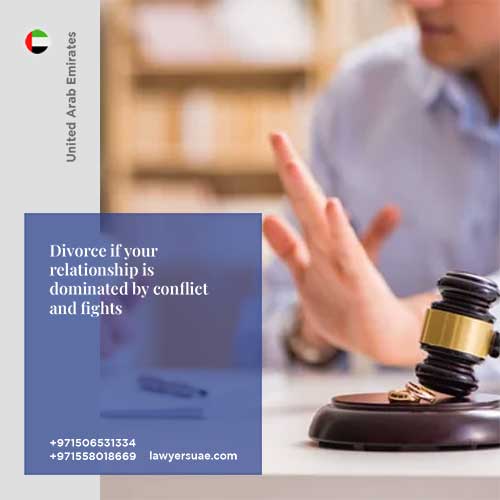If you’re considering a divorce in the UAE, it’s important to consult with an experienced attorney who can help you navigate the process. With their help, you can ensure that your rights are protected and that your divorce is handled correctly.
- Types Of Divorce In UAE
- Signs That You May Need A Divorce
- The Grounds For Divorce In UAE
- Things To Do Before Filing For Divorce
- 1) Gather all of the necessary paperwork
- 2) Create a budget
- 3) Get a lawyer
- 4) Make a list of your assets and debts
- 5) Consider mediation
- 6) Establish credit in your own name
- 7) Evaluate all Your Joint Accounts
- 8) Close your joint credit accounts
- 9) Treat Your Spouse with Respect
- 10) Communicate with Your Spouse
- Islamic Sharia Law For Divorce
- Expatriates Can Apply For Divorce
- The Process Of Filing For Divorce In The UAE
- How Long Does It Take To Get A Divorce In The UAE?
- Things To Consider When Filing For Divorce In UAE
- Dissolution Of Civil Partnerships In UAE
Types Of Divorce In UAE
The UAE Federal Law No. 28/2005 on Personal Status (the “Family Law”) governs divorce in the United Arab Emirates. Article 99(1) of the same provides that the court may grant a divorce if the marriage causes damage to the husband or wife or both of them.
There are two types of divorce:
- Talaq (where the husband unilaterally pronounces divorce)
- Khula (where the wife obtains a divorce from the court)
Talaq is the most common form of divorce in the UAE and can be pronounced by the husband. A husband may divorce her wife up to three times and get back together unless she remarries someone else in the meantime. After the third Talaq, the couple can only reconcile if they go through a court process.
The court may grant Khula if it is satisfied that the marriage has irretrievably broken down and that reconciliation is not possible. The wife must state her reasons for seeking divorce and prove them to the court’s satisfaction.
The following is a complete guide on filing for divorce in the UAE, whether through Talaq or Khula.
This guide is both for UAE Nationals and Expatriates.
Signs That You May Need A Divorce
Before you can even begin to think about filing for divorce, you need first to assess whether or not your marriage is actually in trouble. If you’re not sure, here are some signs that your marriage may be headed for divorce:
- Your communication has deteriorated. You and your spouse no longer communicate effectively, or you speak only to argue.
- Your relationship is dominated by conflict. You can’t seem to agree on anything, and every discussion ends in an argument.
- You’re living separate lives. You have grown apart and are no longer interested in the same things.
- You no longer feel connected to your spouse. You don’t feel any emotional connection to your spouse and are unsure if you ever did.
- You or your spouse has cheated. Infidelity can be a deal-breaker in any marriage.
- You’re considering separation. If you’ve been contemplating separating from your spouse, your marriage is likely in trouble.
It is important to note that these are just signs that your marriage may be in trouble. If you’re unsure if your marriage is broken, it’s always best to consult with a therapist or counselor who can help you assess the state of your relationship.
The Grounds For Divorce In UAE
If you’ve decided that you need to file for divorce, the next step is to determine the grounds for your divorce. In the UAE, there are several grounds for divorce:
- One of the spouses has failed to fulfill their marital duties.
- There is evidence of physical or mental abuse.
- Desertion for a period of more than one or two years.
You will need to prove one of these grounds to get a divorce in the UAE.
Things To Do Before Filing For Divorce
Once you’ve decided to file for divorce, you should do a few things before actually filing the papers.
1) Gather all of the necessary paperwork
This includes your marriage certificate, birth certificates for your children, financial documents, and other relevant paperwork.
2) Create a budget
Once you’re divorced, you’ll need to support yourself and your children. You, therefore, need to create a budget and ensure you have enough money to cover your expenses.
3) Get a lawyer
Divorce can be complicated, so it’s crucial to have an experienced lawyer on your side. Your lawyer can help you navigate the divorce process and protect your interests.
4) Make a list of your assets and debts
Assets include anything of value that you own, such as your car, house, or savings account. Debts include any money you owe, such as credit card debt or a mortgage.
5) Consider mediation
If you and your spouse can agree on some or all of the terms of your divorce, mediation can be a cheaper and faster alternative to going to court. After all, the goal of divorce is to reach an agreement that both parties can live with.
6) Establish credit in your own name
If you’ve been married for a long time, you may have never had the need to establish credit in your own name. But once you’re divorced, you’ll need to have good credit if you want to buy a house or car.
7) Evaluate all Your Joint Accounts
This includes your bank accounts, credit cards, loans, and investments. You’ll need to decide what to do with each account and how to divide the assets between you and your spouse.
8) Close your joint credit accounts
If you have any joint credit accounts, it’s important to close them before you get divorced. This will help protect your credit score and prevent your ex-spouse from racking up debt in your name.
9) Treat Your Spouse with Respect
This may be difficult, but it’s important to remember that you’re going through a complex process. Try to avoid saying or doing anything that could make the situation worse.
10) Communicate with Your Spouse
Divorce can be a stressful and emotional time for both spouses. It’s essential to communicate with your spouse and let them know how you’re feeling. This can help you both get through the divorce process.
Islamic Sharia Law For Divorce
The Islamic Sharia law governs divorce cases. Sharia principles makes it harder for the alienated couple to split, unless the judge is completely convinced the union is not going to work. Step one in the divorce procedure would be to file a case in Family Guidance Section and the Moral . The documents will soon be forwarded to the court in the event the couple, or either of them insists on divorce. Non-Muslims may require their home countries’ laws to be employed in their own cases.
Expatriates Can Apply For Divorce
Non-Muslims as well as other expatriates can apply for divorce in the UAE or within their home country (domicile). It may be rewarding to consult an experienced divorce lawyer, who’ll attempt to work out an amicable resolution for the two sides.
The couple will say their motives for attempting to break up the union. The divorce will likely be given in the event the judge finds the motives to be satisfactory. Some believe that the husband just needs to request three times to divorce (Talaq) to the divorce as well as the wife is finalized. This isn’t officially standing and is just a symbolic gesture. On the other hand, the divorce can be granted by the judge on those reasons, but the divorce isn’t legal unless it is granted by the courts.
After Talaq, the wife, under Sharia Law, must watch Iddat. Iddat continues 3 months. In this method the husband is permitted to insist his wife return to the union. If after the three months the girl still needs the divorce, the union will be dissolved by the judge. The husband can ask for the procedure of Talaq on three different occasions but can simply insist she return two of the three times.
The Process Of Filing For Divorce In The UAE
Once you’ve gathered all the necessary paperwork and made the preparations, you’re ready to file for divorce. The process of filing for divorce in the UAE is as follows:
1) Register your petition with the Family Guidance section of your local court
Each of the emirates has a Family Guidance section, which is responsible for handling divorce cases.
You will need to submit your marriage certificate, birth certificates for any children you have, and a copy of your passport. This will initiate a counseling process to assess the feasibility of reconciliations and the necessity of a divorce.
2) Attend counseling sessions
The Family Guidance section will set up counseling sessions for you and your spouse. These sessions are designed to help you resolve any disagreements and agree on the terms of your divorce.
3) File for divorce
If you and your spouse cannot reach an agreement, you can file for divorce with the court. You will need to submit a divorce petition, which a judge will review.
4) Serve your spouse with the divorce papers
This can be done through a process server or by registered mail.
5) Attend the divorce hearing
After your spouse has been served with the divorce papers, you will need to attend a hearing. This is where a judge will review your case and decide on the terms of your divorce. Appeals can be made within 28 days, but the process can be lengthy and expensive.
6) Finalize the divorce
The divorce will be finalized when a judge makes a decision. This means your marriage will officially be over, and you will be free to remarry.
How Long Does It Take To Get A Divorce In The UAE?
The divorce process in the UAE can take anywhere from a few months to a few years. The length of time it takes to get a divorce depends on the following factors:
- Whether you and your spouse can reach an agreement on the terms of your divorce.
- Whether you file for divorce in the UAE or outside of the country.
- Whether you have any children.
- How complex your divorce is.
- The backlog of cases in the court system.
Generally, you can expect to have a divorce finalized within three months if you and your spouse can reach an agreement on the terms of your divorce. If you file for divorce outside of the UAE, it can take longer.
Things To Consider When Filing For Divorce In UAE
Divorce can be a complex and emotional process. Here are some things to consider when filing for divorce in the UAE:
Child Support
If you have children, you will need to make arrangements for child support. This includes financial support for your children’s education and health care.
Alimony
Alimony is a payment made from one spouse to another after a divorce. This payment is meant to help the receiving spouse maintain their standard of living.
Property Division
If you and your spouse own property, you will need to determine how to divide it between you. This can be a difficult process, but it’s essential to ensure that both spouses are fair.
Child Custody
If you have children, you will need to make arrangements for child custody. This includes the physical custody of your children and the legal custody of their medical and educational records.
Dissolution Of Civil Partnerships In UAE
While civil partnerships are recognized in the UAE, some, like same-sex marriages, are not recognized by Sharia Law. This means that there is no process in place for the dissolution of civil partnerships. The courts may, however, order the dissolution of a civil partnership if it doesn’t comply with Sharia Law.
Though not recognized by Sharia Law, other civil partnerships may be dissolved in the UAE if both parties agree.
How To File For Divorce In UAE: A Full Guide
Hire a Top Divorce Lawyer in Dubai
UAE Divorce Law: Frequently Asked Questions (FAQs)
Family Lawyer
Inheritance Lawyer
Register your Wills
If you’re considering a divorce in the UAE, it’s important to consult with an experienced attorney who can help you navigate the process. With their help, you can ensure that your rights are protected and that your divorce is handled correctly.
You may visit us for a legal consultation, Kindly email us at legal@lawyersuae.com or call us +971506531334 +971558018669 (A consultation fee may apply)





